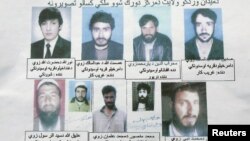More than a week after Afghan President Hamid Karzai ordered U.S. special forces to leave a strategically key area near the capital, officials from both sides are still struggling to resolve the issue.
Karzai ordered the elite American units out of Wardak province after residents complained that they, and Afghans working with them, were torturing and killing civilians - an allegation strongly denied by the United States. At the same time, the Afghan leader also accused the U.S. and NATO of trying to forge an agreement between the Taliban and his political opponents.
The escalating tensions reached Brussels Monday, when NATO Secretary-General Anders Fogh Rasmussen called the charges that international forces are colluding with the Taliban "an absolutely ridiculous idea."
Meanwhile, ISAF spokesman Günter Katz told reporters in Kabul that NATO will eventually hand over security responsibilities for Wardak province, but that the alliance's "Afghan partners" must take the lead on developing a transition plan.
"There will be a transition to the Afghan National Security Forces. The only issue is the timeline and the methodology, but there is no doubt that [the Afghans] will take over the lead of Wardak," said Katz.
The decision to expel U.S. forces from the province - with its predominantly Pashtun population, the same ethnic group as the Taliban - has angered American defense officials who worry an abrupt exit could allow insurgents to strengthen their presence in the area and use it as a base to attack Kabul, only 25 kilometers away.
But Interior Ministry spokesman Sediq Sediqi countered that Afghan forces are already fully capable of handling security operations nationally.
"The total number of Afghan troops nationwide is now 352,000, and that is in addition to the Afghan local police. We are ready to assume security responsibility from NATO anywhere in the country," Sediqi said.
"There is no reason to suggest that after NATO withdraws, a particular province or district will collapse and be taken over by the Taliban, the Haqqani network or al-Qaida," he said.
A possible deal
Reuters, citing a top Kabul official, reported that Afghanistan and the U.S. are working on a compromise deal that would allow American special forces to stay in Wardak in return for full Afghan control of the controversial Bagram prison.
The U.S. partly handed over the high-security jail and around 3,000 suspected Taliban fighters to Afghan control last year. But full control over the jail has been repeatedly delayed as Afghan and U.S. officials argue over concerns that hundreds more Taliban still under U.S. custody would be released.
During a phone call Saturday, Karzai and U.S. Defense Secretary Chuck Hagel said they would work intensively over the next week "with a view to concluding an agreement" on Bagram.
Their discussion came the same day as several hundred Afghan demonstrators chanting "U.S. special forces out!" marched to the parliament building in Kabul demanding the elite commandos withdraw from Wardak.
Karzai ordered the elite American units out of Wardak province after residents complained that they, and Afghans working with them, were torturing and killing civilians - an allegation strongly denied by the United States. At the same time, the Afghan leader also accused the U.S. and NATO of trying to forge an agreement between the Taliban and his political opponents.
The escalating tensions reached Brussels Monday, when NATO Secretary-General Anders Fogh Rasmussen called the charges that international forces are colluding with the Taliban "an absolutely ridiculous idea."
Meanwhile, ISAF spokesman Günter Katz told reporters in Kabul that NATO will eventually hand over security responsibilities for Wardak province, but that the alliance's "Afghan partners" must take the lead on developing a transition plan.
"There will be a transition to the Afghan National Security Forces. The only issue is the timeline and the methodology, but there is no doubt that [the Afghans] will take over the lead of Wardak," said Katz.
The decision to expel U.S. forces from the province - with its predominantly Pashtun population, the same ethnic group as the Taliban - has angered American defense officials who worry an abrupt exit could allow insurgents to strengthen their presence in the area and use it as a base to attack Kabul, only 25 kilometers away.
But Interior Ministry spokesman Sediq Sediqi countered that Afghan forces are already fully capable of handling security operations nationally.
"The total number of Afghan troops nationwide is now 352,000, and that is in addition to the Afghan local police. We are ready to assume security responsibility from NATO anywhere in the country," Sediqi said.
"There is no reason to suggest that after NATO withdraws, a particular province or district will collapse and be taken over by the Taliban, the Haqqani network or al-Qaida," he said.
A possible deal
Reuters, citing a top Kabul official, reported that Afghanistan and the U.S. are working on a compromise deal that would allow American special forces to stay in Wardak in return for full Afghan control of the controversial Bagram prison.
The U.S. partly handed over the high-security jail and around 3,000 suspected Taliban fighters to Afghan control last year. But full control over the jail has been repeatedly delayed as Afghan and U.S. officials argue over concerns that hundreds more Taliban still under U.S. custody would be released.
During a phone call Saturday, Karzai and U.S. Defense Secretary Chuck Hagel said they would work intensively over the next week "with a view to concluding an agreement" on Bagram.
Their discussion came the same day as several hundred Afghan demonstrators chanting "U.S. special forces out!" marched to the parliament building in Kabul demanding the elite commandos withdraw from Wardak.





